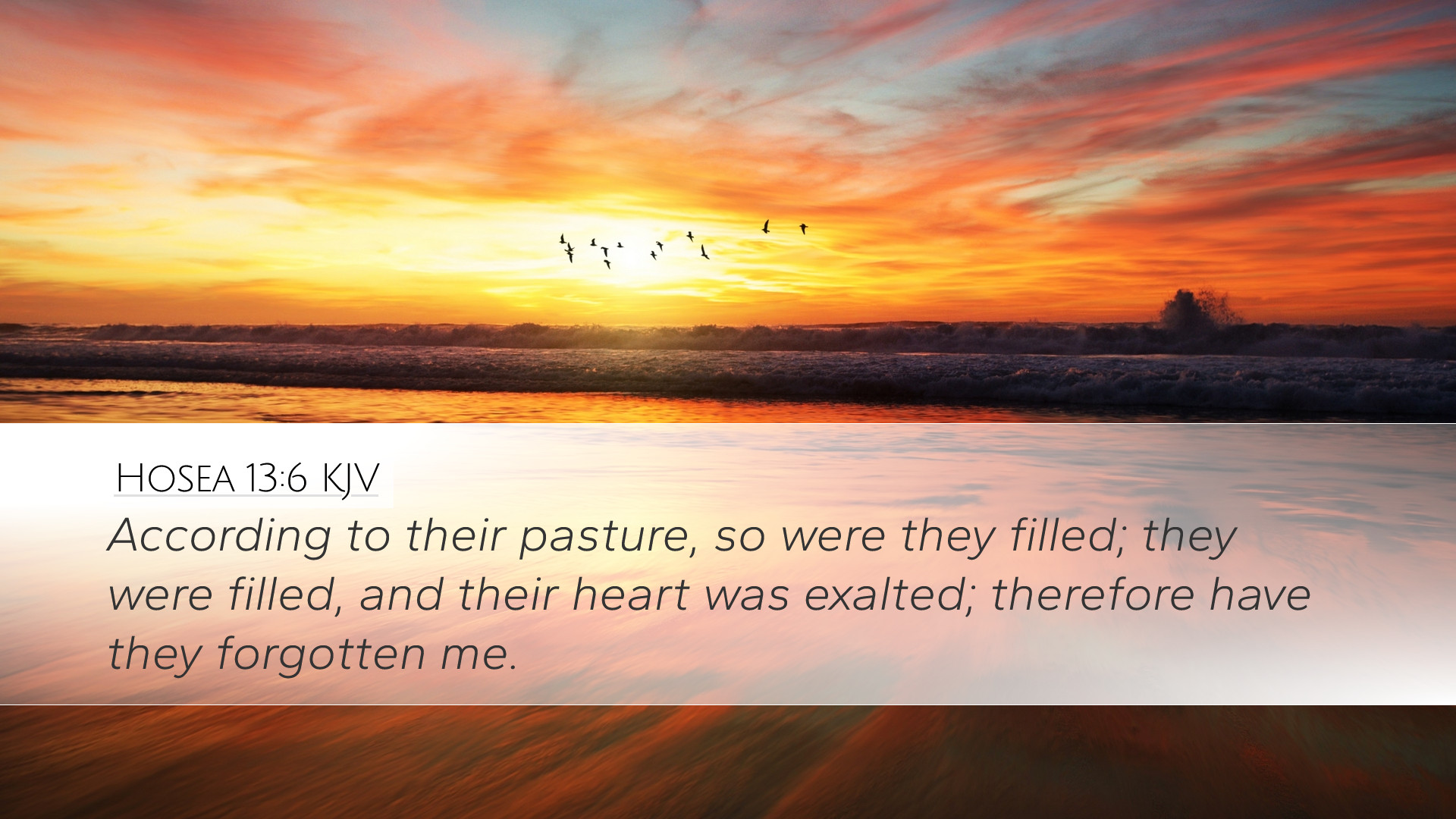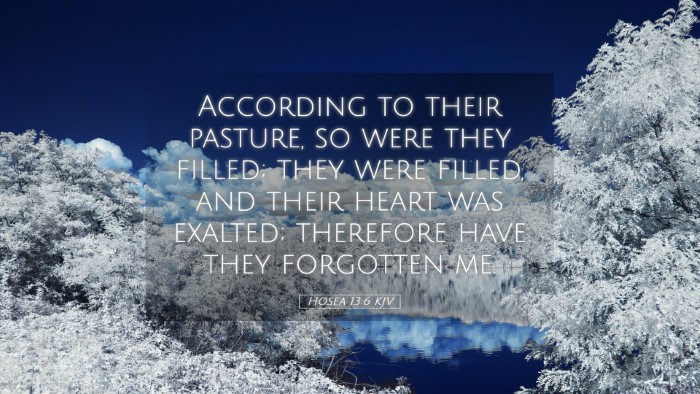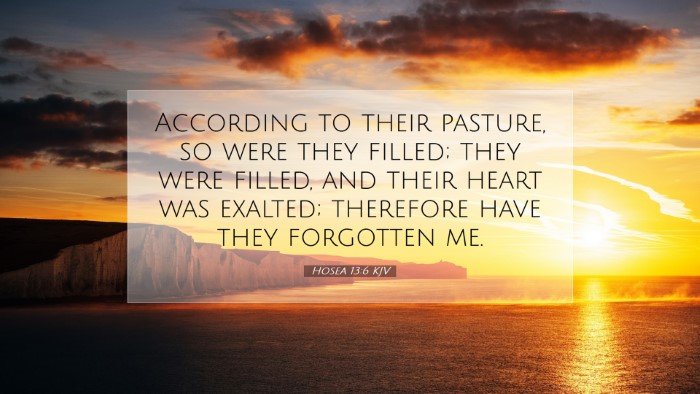Old Testament
Genesis Exodus Leviticus Numbers Deuteronomy Joshua Judges Ruth 1 Samuel 2 Samuel 1 Kings 2 Kings 1 Chronicles 2 Chronicles Ezra Nehemiah Esther Job Psalms Proverbs Ecclesiastes Song of Solomon Isaiah Jeremiah Lamentations Ezekiel Daniel Hosea Joel Amos Obadiah Jonah Micah Nahum Habakkuk Zephaniah Haggai Zechariah MalachiHosea 13:6
Hosea 13:6 KJV
According to their pasture, so were they filled; they were filled, and their heart was exalted; therefore have they forgotten me.
Hosea 13:6 Bible Commentary
Bible Commentary on Hosea 13:6
Verse Context: "According to their pasture, so were they filled; they were filled, and their heart was exalted; therefore have they forgotten me." (Hosea 13:6, KJV)
This verse embodies a critical reflection on the spiritual decline of Israel, illustrating the notion that material abundance often leads to spiritual forgetfulness. Hosea, the prophet, is addressing the people of Israel during a period of prosperity that has resulted in moral decay and disconnection from God.
Key Themes and Interpretations
The commentary on this verse brings to light several key themes that intertwine the relationships of abundance, pride, and forgetfulness of God.
-
The Danger of Prosperity:
Matthew Henry emphasizes that the blessings and prosperity given by God can lead to self-sufficiency and spiritual pride. The Israelites, having been provided for in their pastures, began to rely on their own strength and wealth rather than acknowledging God as the source. This echoes a broader biblical theme that riches can indeed be a snare, leading individuals away from dependence on God.
-
The Consequence of Forgetfulness:
Albert Barnes also highlights the critical nature of forgetfulness in this passage. He notes that when hearts become exalted through abundance, they often forget the very source of their blessings. This forgetfulness is portrayed not as a simple lapse, but as a profound spiritual failure to recognize and remember God’s past faithfulness, leading to a cycle of arrogance and disobedience.
-
Spiritual Complacency:
Adam Clarke observes the complacency that often accompanies affluence. He notes how the Israelites became “fat” or complacent in their spiritual lives when they enjoyed worldly pleasures. This complacency leads to a distancing from God and a turning towards idolatry and sin, as they trust in the created rather than the Creator.
-
The Role of Memory:
Hosea’s warning serves as a reminder of the importance of memory in the life of faith. Remembering God’s acts in the past is critical for sustaining spiritual vitality. The Israelites’ failure to remember God’s provisions led them to exalt themselves, illustrating how spiritual forgetfulness can manifest in pride and rebellion against God’s ways.
Historical Context
Historically, Hosea prophesied during a tumultuous period in Israel's history, just before the Assyrian invasion. The once-thriving northern kingdom was marked by social injustice, idolatry, and moral decay. This backdrop underscores the urgency of the message presented in Hosea 13:6, warning of the consequences of forgetting God amidst their earthly pleasures.
Theological Implications
This verse encapsulates significant theological insights relevant for pastors and theologians alike:
-
The Nature of God’s Providence:
The grace of God is evident in His provision for Israel, yet it raises questions about human responsibility in response to divine gifts. How does one maintain a posture of gratitude amidst blessing?
-
The Peril of Idolatry:
The innate human tendency toward idolatry becomes evident as the people shift their trust away from God. This text serves as a warning against the modern equivalents of idolatry, such as wealth, status, and self-sufficiency.
-
Call to Remembrance:
The exhortation to remember God encourages believers to cultivate a consistent practice of gratitude and reflection on His past mercies. Spiritual disciplines such as prayer, worship, and studying Scripture provide remedies to the tendency towards forgetfulness.
-
The Cycle of Sin and Redemption:
Hosea’s message serves as part of the larger narrative of Scripture which reveals the cycle of sin, discipline, and redemption. Understanding this cycle is crucial for pastoral care, as it offers hope and a pathway back to God’s grace.
Application for Today
As modern readers and practitioners of the faith, Hosea 13:6 remains profoundly relevant in the context of contemporary society:
-
Evaluating Prosperity:
Believers are called to examine their own lives regarding how they respond to prosperity. Are we absorbing our successes as the result of our efforts, or are we recognizing God’s hand in our achievements?
-
Combating Spiritual Complacency:
Christians must be vigilant against complacency that follows success—whether personal, communal, or ecclesiastical. Regular self-examination and accountability within the church community are vital.
-
Encouraging Remembrance:
Creating spaces for remembrance in church services, community gatherings, and personal reflection can help maintain a posture of gratitude. Testimonies of God’s faithfulness can inspire and strengthen collective faith.
Conclusion
Hosea 13:6 serves as a poignant reminder of the complexities surrounding human condition, faithfulness, and the temptation of complacency in times of abundance. The insights derived from the commentaries of respected theologians like Henry, Barnes, and Clarke remind us that in our ease, we must ever be vigilant to not forget the God who sustains us, guiding our hearts to remain humble and thankful.


